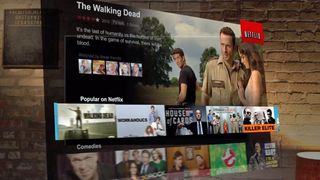Netflix CEO hates paying off ISPs, blames weak net neutrality
Takes on Netflix accounts for 30% of traffic claim

Netflix is paying the fiber optic piper, but doesn't much like it according to the first comments from its CEO since the US Federal Communications Commission's net neutrality rules were declared unenforceable.
"Some big ISPs are extracting a toll because they can - they effectively control access to millions of consumers," said Netflix head Reed Hastings in a blog post today.
He calls out Comcast, Verizon and AT&T by name, saying that ISPs "are willing to sacrifice the interests of their own customers to press Netflix and others to pay."
Netflix customers have experienced poor video quality and long buffering times, which led the company to pay off certain US ISPs to alleviate the network congestion.
So much for Netflix making good on its threat to incite a members' protest.
Comcast an 'industry leader'... of weak net neutrality
The problem is that net neutrality, even in its traditional form, is "weak," according to Hastings.
"The essence of net neutrality is that ISPs such as AT&T and Comcast don't restrict, influence or otherwise meddle with the choices consumers make," he wrote.
Get daily insight, inspiration and deals in your inbox
Get the hottest deals available in your inbox plus news, reviews, opinion, analysis and more from the TechRadar team.
"This weak net neutrality isn't enough to protect an open, competitive internet; a stronger form of net neutrality is required."
What does stronger net neutrality look like? In the eyes of the Netflix CEO, it's all about preventing ISPs from charging tolls for interconnection between services like Netflix and subscribers.
Big guy says it's all about the little guy
Toll-free interconnection matters to millions of smaller websites too as they use interconnection intermediaries such as Cogent, Akamai or Level 3 to deliver data to end-users.
"If this kind of [toll] leverage is effective against Netflix, which is pretty large, imagine the plight of smaller services today and in the future," Hastings wrote.
"Roughly the same arbitrary tax is demanded from the intermediaries such as Cogent and Level 3, who supply millions of websites with connectivity, leading to a poor consumer experience."
About Netflix's 30% internet usage claim
ISPs often defend their position by pointing to studies that show Netflix members streaming habits account for about 30% of peak residential internet traffic.
"ISPs want us to share in their costs, but they don't also offer for Netflix or similar services to share in the ISPs revenue, so cost-sharing makes no sense," Hastings reasoned.
He pointed to more than bad actors among the nationwide ISPs for abiding by net neutrality in its strictest form.
"Some major ISPs, like Cablevision, already practice strong net neutrality and for their broadband subscribers, the quality of Netflix and other streaming services is outstanding."
Unfortunately, Cablevision is the exception to the rule in an environment where there's typically only one high-speed internet choice in most areas.
- It's about time you checked out Android Wear smartwatches
Most Popular

